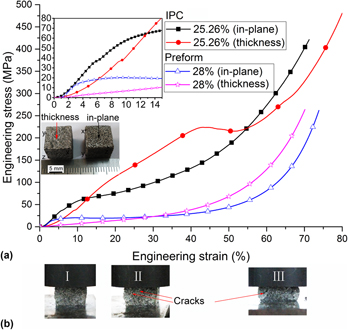Article contents
Anisotropic compressive properties and energy absorption of metal–resin interpenetrating phase composites
Published online by Cambridge University Press: 29 May 2018
Abstract

Metal–resin interpenetrating phase composites (IPCs) have been produced by spontaneously infiltrating unsaturated polyester resin into porous stainless steel fibrous preforms under vacuum conditions. The compressive behaviors of the IPCs were investigated and the fractures were examined. The compressive strength and elastic modulus increase with increasing fiber fraction. The structures, compressive behaviors, and energy absorption capacities of the IPCs exhibit anisotropy. A higher compressive strength, lower elastic modulus, and lower energy absorption efficiency are observed in the through-thickness direction. The energy absorption efficiency slightly decreases with increasing fiber fraction in a certain range rather than monotonically increasing or decreasing. The energy absorption efficiency in the in-plane direction is superior to that in the through-thickness direction. Finer fibers improve the strength and elastic modulus but have little influence on the energy absorption efficiency. Resin collapse, fiber necking, and debonding are the main failure types observed in the composites.
Information
- Type
- Article
- Information
- Copyright
- Copyright © Materials Research Society 2018
References
REFERENCES
- 7
- Cited by

